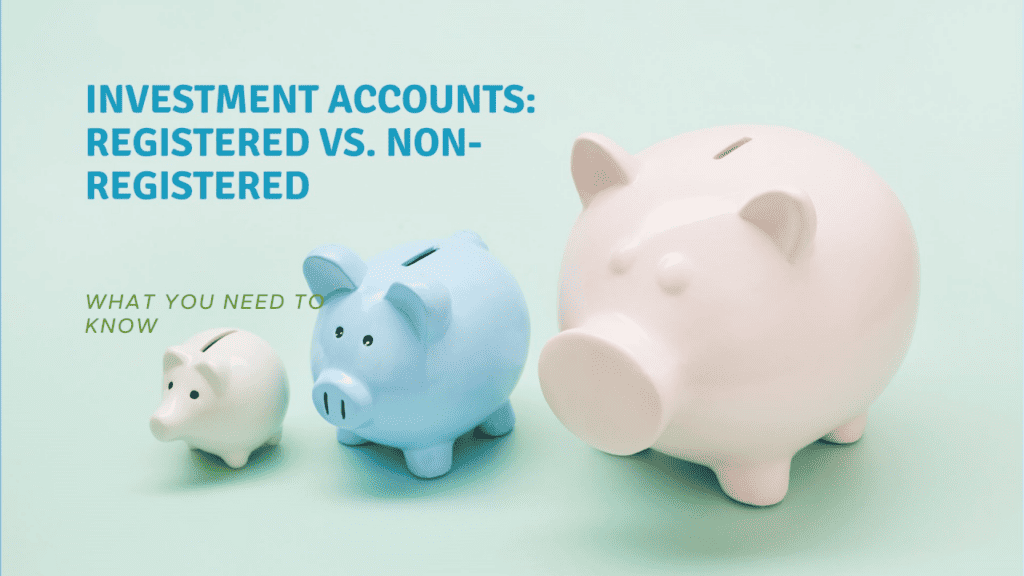The First Home Savings Account (FHSA) is designed to assist...
Read MoreTFSA vs Non-Registered Account: Which One Should You Use in 2025?

Choosing the Right Account to Maximize Your Investment Returns
If you’re planning to invest in 2025, one of the most common questions is: Should I put this money in my TFSA or a non-registered account?
The answer depends on your goals, income, and tax strategy. Both accounts have their place—but understanding the key differences can help you build a more efficient portfolio.
This article compares the TFSA vs non-registered account options and helps you decide which one makes the most sense for your next investment.
What’s the Difference Between a TFSA and a Non-Registered Account?
A Tax-Free Savings Account (TFSA) is a registered account that allows Canadians to earn income and growth without paying any tax on it—ever. You can withdraw money at any time, for any reason, tax-free.
A non-registered investment account is not tax-sheltered. That means any income or gains are taxable—but there are fewer rules, no contribution limits, and more flexibility around how you use the account.
Here’s the key difference:
- In a TFSA, the government gives you a tax advantage.
- In a non-registered account, you’re taxed on earnings like interest, dividends, or capital gains.
When a TFSA Is the Better Option
In 2025, the TFSA limit is $7,000, and if you’ve never contributed before, you may have up to $95,000 in available room. For most investors, this is the first place to put your money.
You should prioritize your TFSA if:
- You haven’t maxed it out yet
- You’re investing for long-term growth
- You expect strong gains (capital appreciation, compounding)
- You want to avoid tax on income or withdrawals
The TFSA is especially powerful for holding:
- Mutual funds
- Segregated funds
- Growth-focused investments
High-interest GICs or bond funds - U.S. or international funds (to avoid foreign withholding tax)
Drawback: You’re limited by the annual contribution room. And if you over-contribute, penalties apply.
When a Non-Registered Account Makes More Sense
Once your TFSA is maxed out—or if you’re investing a large amount—you may need to use a non-registered account.
This option is ideal when:
- You’ve already contributed the max to your TFSA
- You want to invest more than your available TFSA room
- You need the flexibility to write off capital losses
- You’re using investment loans or leveraged strategies
Non-registered accounts allow for:
- Unlimited contributions
- Tax-loss harvesting (claiming losses against gains)
Capital gains taxed at only 50% - Flexibility for advanced strategies
Drawback: You’ll pay tax annually on interest, dividends, and 50% of any capital gains. That can reduce your overall return.
Tax Comparison Example
Let’s say you invest $50,000 and it grows by 6% annually.
- In a TFSA, your gains are 100% tax-free
- In a non-registered account, you’ll owe tax on your earnings each year
Over 10 years, that tax drag can reduce your total return by thousands of dollars.

How to Use Both Accounts Strategically
In reality, many investors should use both accounts—but for different purposes.
Use your TFSA to hold:
- Long-term growth assets
- Investments with high return potential
- Tax-inefficient income (like interest or foreign dividends)
Use your non-registered account to hold:
- Investments that generate capital gains
- Canadian dividend stocks (eligible for dividend tax credit)
- Assets you may want to sell strategically for tax planning
This way, you get the best of both: tax-free growth where it matters, and flexibility where it’s needed.
Should You Move Investments Between the Two?
You can’t directly transfer investments from a non-registered account to a TFSA without triggering a tax event.
However, if you have room in your TFSA, you can:
- Sell the investment in your non-registered account
- Pay any applicable taxes
- Move the cash into your TFSA and repurchase the same (or different) investment
If you sell at a loss, that loss is not claimable if you move the funds into your TFSA, so timing matters.
Final Thoughts
When comparing a TFSA vs non-registered account, the best choice depends on your current contribution room, your long-term goals, and your tax bracket.
If you still have some room in your TFSA, that should be your first step—it gives you tax-free growth with full flexibility. Once your TFSA is maxed, use a non-registered account to continue building your portfolio without contribution limits.
At Ai Financial, we help clients manage both types of accounts—using TFSAs for tax-efficient growth and non-registered accounts for overflow investing or advanced planning. If you’re not sure how to balance the two, we can help build a strategy that fits your financial goals.
Need help deciding where to invest next? Contact Ai Financial to speak with an advisor and get a personalized investment plan for 2025.
More blogs in Financial Tool
5 Smart FHSA Investment Tips for New Buyers | Financial Tool
Looking to boost your down payment with smart investing? The...
Read MoreTop 5 Reasons Parents Should Start an RESP Early| Financial Tool
Thinking about your child’s future? Starting an RESP early can...
Read MoreTop 5 Investment Loan Options for Small Business Owners in 2025 | Financial Tool
Explore the top 5 investment loan options for small business...
Read MoreSegregated Funds vs. Mutual Funds: the Estate Planning Benefits of Segregated Funds
Segregated funds vs. mutual funds for estate planning
Read MoreRecent Posts
You may also interested in
Leverage Investment Success: How Clients Achieved Over 200% Leverage Returns| AiF Clients
Discover how a Canadian family achieved 239% returns using strategic...
Read MoreCanadian Soldier Achieves 204% ROI with Investment Loan and Segregated Fund| AiF Clients
Zack, a Canadian soldier in his 40s, turned limited savings...
Read MoreFrom $100K to $520K: How a Millennial Actuary Couple Achieved a 154% Leveraged Return| AiF Clients
Discover how a millennial actuary couple used investment loans and...
Read MoreCan Non-Residents Invest in Segregated Funds in Canada?Hazel’s Journey with Ai Financial| AiF Clients
Hazel, a non-resident mother in Canada, invested CAD $200,000 across...
Read MoreFrom Anxiety to Empowerment: How a Mom of 3 Gained $67K in 20 Months | AiF Clients
Zara, a working mom of three, turned $200K into $259K...
Read More










